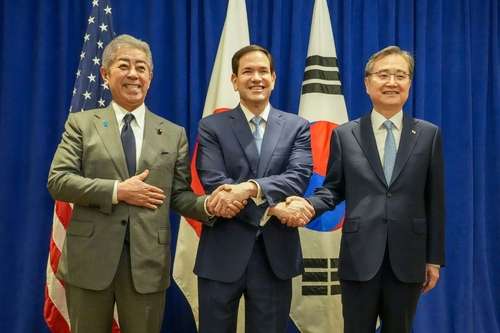
South Korea, US, Japan reaffirm denuclearisation push despite Kim’s conditions
The foreign ministers of South Korea, the United States, and Japan reaffirmed their commitment to North Korea’s denuclearisation, despite Pyongyang’s renewed resistance, during a trilateral meeting on the sidelines of the United Nations General Assembly in New York on Monday.
The joint statement came a day after North Korean leader Kim Jong-un indicated he might resume dialogue with Washington if the U.S. dropped its denuclearisation demand. Kim declared he has “no intention” of abandoning his nuclear arsenal, warning that sanctions or displays of force would not sway Pyongyang.
South Korean Foreign Minister Cho Hyun, U.S. Secretary of State Marco Rubio, and Japanese Foreign Minister Takeshi Iwaya stressed their “resolute commitment” to the complete denuclearisation of North Korea in line with United Nations Security Council resolutions. They also vowed to uphold sanctions and respond firmly to violations.
The ministers reaffirmed that Washington’s extended deterrence guarantees to Seoul and Tokyo remain “critically important” for regional stability. They pledged to strengthen trilateral security cooperation, including through the Freedom Edge multidomain exercise, and to enhance their individual defense capabilities.
The statement also underscored shared opposition to “unlawful maritime claims” in the South China Sea and voiced concern over destabilizing actions in the Taiwan Strait, urging peaceful resolution of cross-Strait tensions.
Additionally, the three expressed alarm at North Korea’s growing military ties with Russia, particularly Moscow’s support for Pyongyang’s missile program. They agreed to deepen collaboration against North Korea’s cyber operations and to expand trilateral cooperation on economic security, including supply chain resilience, digital infrastructure, and artificial intelligence.
South Korea further raised concerns about its citizens recently detained in Georgia, with Secretary Rubio pledging U.S. support for resolving the issue in light of the bilateral alliance.